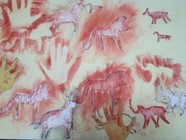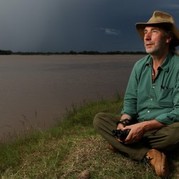Oxford University Press replies
 West Oxford School: year 3 prehistoric art
West Oxford School: year 3 prehistoric art Pupils at the school agreed that nature words should not be scrapped. Frith Dixon, seven, said: “I love playing outdoors so I think the nature words should stay.” Rosie Gee, also seven, added: “I live on a farm and I love learning about nature.”
a vital means of connection and understanding - Sir Andrew Motion
 Simon Barnes by Dave Bebber
Simon Barnes by Dave Bebber Sir Andrew Motion, the former poet laureate, told the Guardian that “by discarding so many country and landscape-words from their Junior Dictionary, OUP deny children a store of words that is marvellous for its own sake, but also a vital means of connection and understanding.
“Their defence – that lots of children have no experience of the countryside – is ridiculous. Dictionaries exist to extend our knowledge, as much (or more) as they do to confirm what we already know or half-know.”
Elsewhere in the Guardian, Patrick Barkham writes “It would be hard to find a more striking example of our alienation from the natural world, and how we are denying children a relationship with wild things.
“Oxford University Press may have joined mainstream educators and the other purveyors of neoliberal capitalism in assuming that nature must be abandoned to the nagging demands of technology but how can we make space for nature in children’s lives?” He then goes on to offer Five Simple Ways to Help your Child get Into the Wild.
Shooting the messenger?
Alistair Fraser from Kootenay Lake, Canada, writes a nature blog Exploring Kootenay Lake. In a thoughtful piece he writes “It seems to me that the Oxford Junior Dictionary is being blamed for recognizing a deeper problem: the decline in the relevance of the natural world to today’s children. Is this a problem of Oxford’s making? Hardly. Does Oxford make a convenient scapegoat? It would seem so.”
Fraser’s blog is beautifully illustrated with his own pictures of some of the wildlife removed from the dictionary, including otters, a (great blue) heron, a (belted) kingfisher and a beaver. He concludes: “The solution (if indeed there is one) does not lie with shooting the messenger (Oxford University Press); it involves dealing with the problem: the increasing irrelevance of the natural world for urbanites and their children.”
Alistair Fraser emailed me to alert me to his blog and I have replied: “To some extent I accept the charge of shooting the messenger and completely agree that the problem lies more deeply in society.
“However, making any kind of inroad into such a seemingly unstoppable process requires strong signals from those who have a leading role in cultural life. The Oxford Dictionary brand occupies such a position throughout the English speaking world. The OUP's edits, as you say in your blog, have all the appearance of being systematically anti-nature and pro-technology. Whilst I am sure there was no overt agenda in this, it makes them part of the problem. Correcting their error would be an even stronger signal in favour of natural childhood, and this is what we are calling on them to do.”
 RSS Feed
RSS Feed
